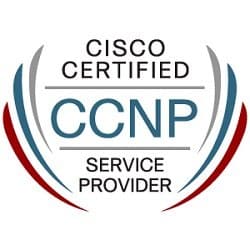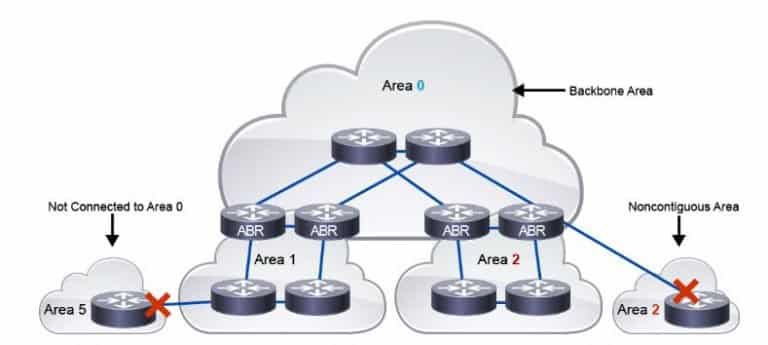Obiettivi | Certificazione | Contenuti | Tipologia | Prerequisiti | Durata e Frequenza | Docenti | Modalità di Iscrizione | Calendario

Il Corso SPCOR Implementing and Operating Cisco Service Provider Network Core Technologies rappresenta il pilastro fondamentale del percorso tecnologico e di certificazione Service Provider. Esso infatti prepara il partecipante all’esame Core della Certificazione CCNP Service Provider (Esame 350-501). In questo corso si affronteranno le tecnologie necessarie per implementare le più recenti soluzioni Service Provider IP network infrastructures. Questo corso pone l’attenzione su tematiche come: OSPF, IS-IS, BGP, Route Maps, RPL, IPV6, MPLS, Segment Routing, VPN Services, L2VPN, L3VPN, Multicast, QOS, SDN, Cisco NSO, NFV Infrastructure e altro ancora. Il Corso contribuisce alla preparazione dell’esame di Certificazione CCNP Service Provider (Esame 350-501).
Contattaci ora per ricevere tutti i dettagli e per richiedere, senza alcun impegno, di parlare direttamente con uno dei nostri Docenti (Clicca qui)
oppure chiamaci subito al nostro Numero Verde (800-177596)
Obiettivi del corso
Di seguito una sintesi degli obiettivi principali del Corso SPCOR Implementing and Operating Cisco Service Provider Network Core Technologies:
- Comprendere e implementare le tecnologie OSPF, IS-IS e BGP.
- Applicare soluzioni come Route Maps, RPL e IPV6.
- Familiarizzare con MPLS, Segment Routing e servizi VPN.
- Approfondire temi come Multicast, QOS e SDN.
- Acquisire competenze su Cisco NSO e NFV Infrastructure
Certificazione del corso
Esame 350-501 SPCOR Implementing and Operating Cisco Service Provider Network Core Technologies;
Esame Parte delle Certificazioni: CCNP Service Provider, CCIE Service Provider. Il programma di certificazione CCNP Service Provider prepara per i ruoli professionali nelle odierne tecnologie sulla fornitura di servizi telematici enterprise. La CCNP Service Provider ora include elementi di automazione e programmabilità per la massima scalabilità delle moderne infrastrutture dei service provider. In particolare l’esame 350-501 SPCOR testa competenze su argomenti quali: implementing core service provider network, implementing core architecture, implementing services, implementing networking, implementing automation, quality of services, security, e network assurance.
Contenuti del corso
- Describing Service Provider Network Architectures
- Service Provider Core Architectures
- Unified MPLS
- Network Transport Technologies
- Ethernet OAM Overview
- ERP Overview
- Evolved Packet Core
- Describing Cisco IOS Software Architectures
- Cisco IOS XE Software Fundamentals
- Cisco IOS XR Architecture
- Cisco IOS XR -Bit and -Bit Differences
- Cisco IOS XR -Bit Operational Enhancements
- Cisco IOS XR Container and VM Architecture
- Deploy Cisco IOS XR and IOS XE Basic Device Configuration
- Implementing OSPF
- OSPF Routing
- OSPF Link-State Database
- OSPF Operation
- OSPF Adjacencies and Modes
- OSPF Implementation
- Multiarea OSPF
- OSPFv Implementation
- Basic OSPF Troubleshooting
- Implement OSPF Routing
- Implementing IS-IS
- Integrated IS-IS Routing
- IS-IS Operation
- IS-IS Link-State Database
- Integrated IS-IS for IPv
- IS-IS Configuration for IPv
- IS-IS Configuration for IPv
- Basic IS-IS Troubleshooting
- Implement Integrated IS-IS Routing
- Implementing BGP
- BGP in Customer Connections
- BGP Routing
- BGP Implementation
- BGP Path Selection
- Weight and Local Preference
- AS Path Prepending and MEDs
- BGP Communities
- Redistribution Implementation
- Basic BGP Troubleshooting
- Implement Basic BGP Routing
- Implementing Route Maps and RPL
- Routing Protocol Tools Overview
- Prefix Lists and AS Path Access Lists
- RPL Parameters and Parameterization
- RPL Implementation
- Filter BGP Prefixes Using RPL
- Transitioning to IPv
- Transitioning from IPv to IPv
- Translation Mechanisms
- IPv Tunneling Mechanisms
- Implementing High Availability in Networking
- Implementing MPLS
- MPLS Architecture
- MPLS Applications
- MPLS Forwarding Operation
- MPLS Configuration
- LDP Advanced Configuration
- MPLS Monitoring
- MPLS Troubleshooting
- Unified MPLS Architecture
- Implement MPLS in the Service Provider Core
- Implementing Cisco MPLS Traffic Engineering
- Traffic Engineering Concepts
- Cisco MPLS TE Operation
- Constraint-Based Path Computation
- Cisco MPLS TE Tunnel Attributes
- Traffic Steering
- Cisco MPLS TE Implementation
- Protection of Cisco MPLS TE Traffic
- Implement Cisco MPLS TE
- Describing Segment Routing
- Segment Routing Concepts
- SR IGP Control Plane Overview
- Segment Types
- TI-LFA Fundamentals
- Segment Routing TE Overview
- PCE-PCC Architecture
- Implement Segment Routing
- Describing VPN Services
- MPLS VPN Architecture
- MPLS VPN Routing
- Interdomain MPLS VPN Solutions
- CSC Overview
- Multicast VPN Overview
- EVPN Terminology and Concepts
- Configuring LVPN Services
- MPLS Layer VPN Types
- EoMPLS Configuration
- Implement EoMPLS
- VPLS Configuration
- Configuring LVPN Services
- MPLS LVPN Backbone Implementation
- VRF Configuration
- MP-BGP Configuration
- Basic PE-CE Routing Implementation
- OSPF as PE-CE Protocol
- BGP as PE-CE Protocol
- Implement MPLS LVPN
- MPLS LVPN Shared Services
- Internet Access in MPLS LVPN
- Implementing Multicast
- Multicast Overview
- Multicast Service Model
- Multicast Protocols
- Dynamic RP Mechanisms
- PIM-SM Enhancements Overview
- Interdomain Multicast Routing
- IPv Multicast Implementation
- Describing QoS Architecture
- Models for Implementing QoS
- QoS Trust Boundaries
- Cisco MPLS TE QoS
- Implementing QoS
- QoS Mechanisms
- QoS Implementation
- Congestion Management
- Congestion Avoidance Implementation
- Traffic Policing and Shaping
- Implementing Control Plane Security
- Control Plane Protection Overview
- LDP Security Implementation
- IGP Control Plane Security
- BGP Security Implementation
- Implement BGP Security
- BGP FlowSpec Implementation
- Implementing Management Plane Security
- Management Plane Security Overview
- AAA Implementation
- REST API Security
- Implementing Data Plane Security
- ACL Implementation
- uRPF Implementation
- RTBH Filtering Implementation
- Implement RTBH Filtering
- Introducing Network Programmability
- YANG Data Types
- XPath Overview
- Basic YANG Statements
- Pyang Tool
- Implementing Automation and Assurance
- NETCONF Overview
- RESTCONF Overview
- gNMI Overview
- Model Driven Telemetry Overview
- NetFlow Overview
- SNMP Overview
- Introducing Cisco NSO
- Logical Architecture
- Components
- Orchestration Use Cases
- Packages
- Mapping Logic
- Network Element Drivers
- Implementing Virtualization in Service Provider Environment
- NFV Infrastructure
Attività Laboratoriali
- Deploy Cisco IOS XR and IOS XE Basic Device Configuration
- Implement OSPF Routing
- Implement Integrated IS-IS Routing
- Implement Basic BGP Routing
- Filter BGP Prefixes Using RPL
- Implement MPLS in the Service Provider Core
- Implement Cisco MPLS Traffic Engineering (TE)
- Implement Segment Routing
- Implement Ethernet over MPLS (EoMPLS)
- Implement MPLS L3VPN
- Implement BGP Security
- Implement Remotely Triggered Black Hole (RTBH) Filtering
Tipologia
Corso di Formazione con Docente
Docenti
I docenti sono Istruttori accreditati CISCO e certificati in altre tecnologie IT, con anni di esperienza pratica nel settore e nella Formazione.
Infrastruttura laboratoriale
Per tutte le tipologie di erogazione, il Corsista può accedere alle attrezzature e ai sistemi reali Cisco presenti nei Nostri laboratori o direttamente presso i data center Cisco in modalità remota h24. Ogni partecipante dispone di un accesso per implementare le varie configurazioni avendo così un riscontro pratico e immediato della teoria affrontata. Ecco di seguito alcune topologie di rete dei Laboratori Cisco Disponibili:

Dettagli del corso
Prerequisiti
Si consiglia la partecipazione al Corso Cisco CCNA.
Durata del corso
- Durata Intensiva 5gg;
Frequenza
Varie tipologie di Frequenza Estensiva ed Intensiva.
Date del corso
- Corso Cisco SPCOR (Formula Intensiva) – 04/11/2024 – 09:00 – 17:00
Modalità di iscrizione
Le iscrizioni sono a numero chiuso per garantire ai tutti i partecipanti un servizio eccellente.
L’iscrizione avviene richiedendo di essere contattati dal seguente Link, o contattando la sede al numero verde 800-177596 o inviando una richiesta all’email [email protected].


